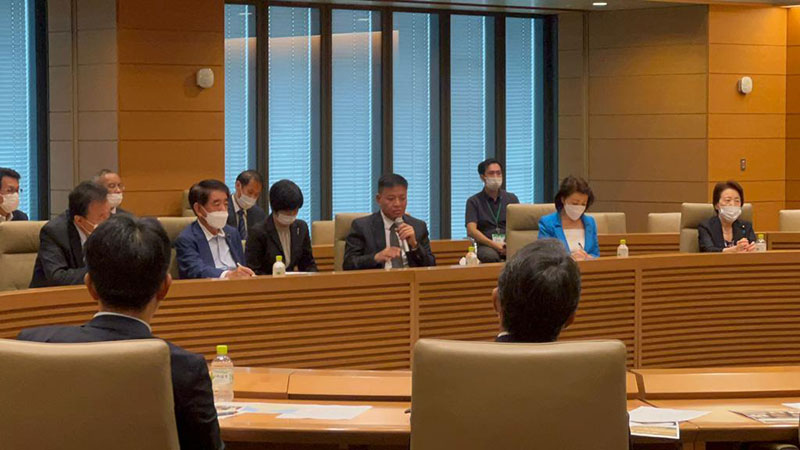Tokyo — Sikyong of the Central Tibetan Administration, visited Japan for a week and met with Japanese parliamentarians and students from Japanese universities. He urged the parliamentarians to adopt resolutions similar to those of the US Congress and appoint a Special Coordinator for Tibet.
Sikyong (President) of the Central Tibetan Administration (CTA) visited Japan from 21 September to 27 September 2022. During the six days, Sikyong Penpa Tsering visited the Japanese Parliament building in Nagatacho, then went to the cabin of former Prime Minister Abe Shinzo in the parliament building and paid his respects, and prayed in front of the portrait of the deceased. Then Sikyong visited two renowned universities in Chiba Prefecture, the Chiba Institute of Technology and Reitaku University, where he delivered a speech on "Tibet in the International Context" to students and faculty members. He then visited Saitama Medical University. Lastly, Sikyong met with representatives and members of the twelve major Tibet support groups in Japan.
On the first day, Sikyong visited the Japanese parliament building in Nagatacho, where Chairman Shimomura Hakubun of the Japanese Parliamentary Support Group for Tibet and members received and welcomed him in the parliament conference room. Chairman Shimomura, Vice Chairman Watanabe and Sakurai Yoshiko of the Japan Institute for National Foundations welcomed Sikyong Penpa Tsering and briefed him on the work of the Parliamentary Support Group. They reaffirmed their continued support for the resolution of the Sino-Tibetan conflicts.
At the meeting, Sikyong expressed his deep thanks on behalf of all Tibetans for the unconditional support of the Japanese legislators. He informed the legislators about the good health of His Holiness the Dalai Lama and his four engagements. Sikyong also spoke about the importance of the Tibetan plateau and its impact on Southeast Asian countries and the global climate. He informed the parliamentarians about the current situation in Tibet and how Communist China is trying to eradicate Tibetan identity, culture and language.
Sikyong also called on parliamentarians of Japan to pass resolutions similar to those of the US Congress and to appoint a special coordinator for Tibet. In addition, Sikyong requested financial assistance and cooperation to vitalise Tibetan settlements and strengthen human and material resources.
After the meeting with the parliamentarians, Sikyong went to the cabin of former Prime Minister Abe Shinzo in the parliament building and paid his respects and prayed before the portrait of the deceased.
Sikyong visited two renowned Japanese universities in Chiba Prefecture, the Chiba Institute of Technology and Reitaku University on September 22, 2022, where he delivered a speech on "Tibet in the International Context" to students and faculty members. He also interacted with the students.
On the next day, Sikyong participated in a seminar titled “Tibet, Uyghur, and South Mongolia: occupied nations under the CCP, building a common ground,” where Sikyong was the main speaker. Japanese parliamentarians, think tank members, Uyghur and South Mongolia representatives, and media people attended the seminar at the Bunkyo civic centre hall in Tokyo.
The following day, Sikyong participated in a seminar entitled "Tibet, Uyghur and Southern Mongolia: Occupied Nations under the CCP, Building Common Ground", which was held at the Bunkyo Civic Centre Hall in Tokyo, where Sikyong was the keynote speaker. The seminar was attended by Japanese parliamentarians, think tank members, Uyghur and Southern Mongolian representatives, and media representatives.
Sikyong attended a press conference after the seminar, where journalists and reporters from twelve major Japanese media outlets interacted with him. He clarified the Middle Way Approach and the historical reality of Tibetan independence and explained the current situation in Tibet. Sikyong visited the Tibet office and met with Tibetans in Japan. He explained the Kashag's policy and asked Tibetans not to forget their brothers and sisters suffering under the Chinese communist regime. He reminded them of their responsibility as Tibetans and the need to preserve the Tibetan identity.
Sikyong met with representatives and members of the twelve major Tibet support groups in Japan. He thanked them for their support and informed them about the situation in Tibet and the policy of the Central Tibetan Administration. Later, Sikyong also met with supporters, sponsors, volunteer translators and helpers of the Tibet House.
Source: the Office of Tibet, Japan


![Tibet has a rich history as a sovereign nation until the 1950s when it was invaded by China. [Photo: File]](/images/stories/Pics-2024/March/Tibet-Nation-1940s.jpg#joomlaImage://local-images/stories/Pics-2024/March/Tibet-Nation-1940s.jpg?width=1489&height=878)
















